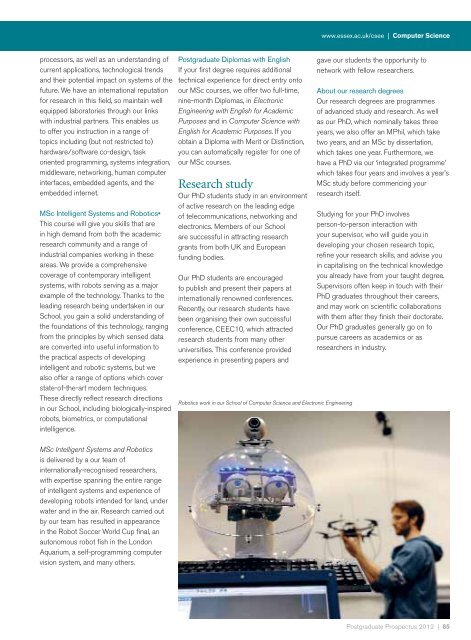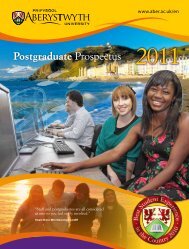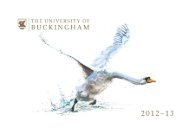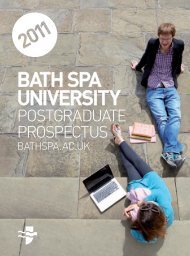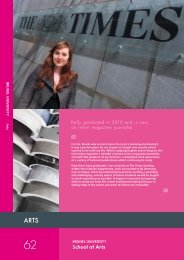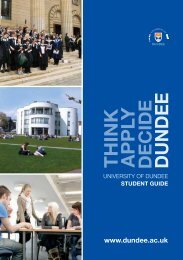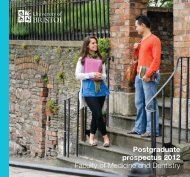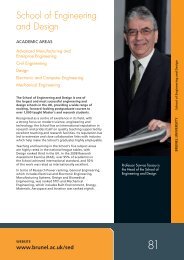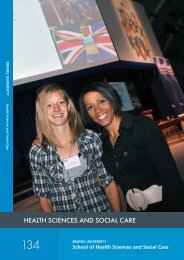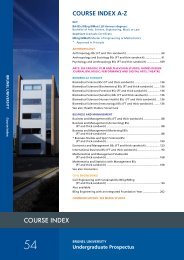Postgraduate Prospectus
Postgraduate Prospectus
Postgraduate Prospectus
Create successful ePaper yourself
Turn your PDF publications into a flip-book with our unique Google optimized e-Paper software.
www.essex.ac.uk/csee | Computer Science<br />
processors, as well as an understanding of<br />
current applications, technological trends<br />
and their potential impact on systems of the<br />
future. We have an international reputation<br />
for research in this field, so maintain well<br />
equipped laboratories through our links<br />
with industrial partners. This enables us<br />
to offer you instruction in a range of<br />
topics including (but not restricted to)<br />
hardware/software co-design, task<br />
oriented programming, systems integration,<br />
middleware, networking, human computer<br />
interfaces, embedded agents, and the<br />
embedded internet.<br />
MSc Intelligent Systems and Robotics•<br />
This course will give you skills that are<br />
in high demand from both the academic<br />
research community and a range of<br />
industrial companies working in these<br />
areas. We provide a comprehensive<br />
coverage of contemporary intelligent<br />
systems, with robots serving as a major<br />
example of the technology. Thanks to the<br />
leading research being undertaken in our<br />
School, you gain a solid understanding of<br />
the foundations of this technology, ranging<br />
from the principles by which sensed data<br />
are converted into useful information to<br />
the practical aspects of developing<br />
intelligent and robotic systems, but we<br />
also offer a range of options which cover<br />
state-of-the-art modern techniques.<br />
These directly reflect research directions<br />
in our School, including biologically-inspired<br />
robots, biometrics, or computational<br />
intelligence.<br />
<strong>Postgraduate</strong> Diplomas with English<br />
If your first degree requires additional<br />
technical experience for direct entry onto<br />
our MSc courses, we offer two full-time,<br />
nine-month Diplomas, in Electronic<br />
Engineering with English for Academic<br />
Purposes and in Computer Science with<br />
English for Academic Purposes. If you<br />
obtain a Diploma with Merit or Distinction,<br />
you can automatically register for one of<br />
our MSc courses.<br />
Research study<br />
Our PhD students study in an environment<br />
of active research on the leading edge<br />
of telecommunications, networking and<br />
electronics. Members of our School<br />
are successful in attracting research<br />
grants from both UK and European<br />
funding bodies.<br />
Our PhD students are encouraged<br />
to publish and present their papers at<br />
internationally renowned conferences.<br />
Recently, our research students have<br />
been organising their own successful<br />
conference, CEEC10, which attracted<br />
research students from many other<br />
universities. This conference provided<br />
experience in presenting papers and<br />
Robotics work in our School of Computer Science and Electronic Engineering<br />
gave our students the opportunity to<br />
network with fellow researchers.<br />
About our research degrees<br />
Our research degrees are programmes<br />
of advanced study and research. As well<br />
as our PhD, which nominally takes three<br />
years, we also offer an MPhil, which take<br />
two years, and an MSc by dissertation,<br />
which takes one year. Furthermore, we<br />
have a PhD via our ‘integrated programme’<br />
which takes four years and involves a year’s<br />
MSc study before commencing your<br />
research itself.<br />
Studying for your PhD involves<br />
person-to-person interaction with<br />
your supervisor, who will guide you in<br />
developing your chosen research topic,<br />
refine your research skills, and advise you<br />
in capitalising on the technical knowledge<br />
you already have from your taught degree.<br />
Supervisors often keep in touch with their<br />
PhD graduates throughout their careers,<br />
and may work on scientific collaborations<br />
with them after they finish their doctorate.<br />
Our PhD graduates generally go on to<br />
pursue careers as academics or as<br />
researchers in industry.<br />
MSc Intelligent Systems and Robotics<br />
is delivered by a our team of<br />
internationally-recognised researchers,<br />
with expertise spanning the entire range<br />
of intelligent systems and experience of<br />
developing robots intended for land, under<br />
water and in the air. Research carried out<br />
by our team has resulted in appearance<br />
in the Robot Soccer World Cup final, an<br />
autonomous robot fish in the London<br />
Aquarium, a self-programming computer<br />
vision system, and many others.<br />
<strong>Postgraduate</strong> <strong>Prospectus</strong> 2012 | 85


